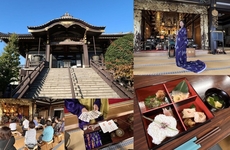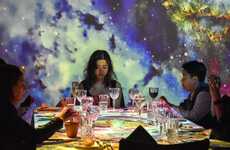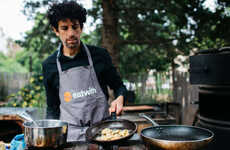
The Peace Kitchen Shares Japanese Food and Culture Traditions
Laura McQuarrie — April 22, 2015 — World
References: peace-kitchen.org & en.rocketnews24
Aiming to increase the number of people who get to experience Japanese food and culture on a global scale, Peace Kitchen was developed as a collaboration between the founders of Table for Two, the designers of umari and GLIDER. Since first-hand experience is key to building awareness on any issue, Peace Kitchen does this by creating culinary experience for people to partake in.
These events are hosted in destinations like Italy, Kenya and Uganda, showing off parts of the culture like sculpting mochi, pouring sake. Even if there is a language barrier, nonverbal communication creates an understanding of what needs to be done and makes everybody feel part of the small community.
Although many of Peace Kitchen's events celebrate Japan's ancient roots, technology is often integrated to enhance the experience. For instance, equipped with sound and movement sensors, traditional Japanese lanterns are able to give off colors that reflect the energy of a room.
These events are hosted in destinations like Italy, Kenya and Uganda, showing off parts of the culture like sculpting mochi, pouring sake. Even if there is a language barrier, nonverbal communication creates an understanding of what needs to be done and makes everybody feel part of the small community.
Although many of Peace Kitchen's events celebrate Japan's ancient roots, technology is often integrated to enhance the experience. For instance, equipped with sound and movement sensors, traditional Japanese lanterns are able to give off colors that reflect the energy of a room.
Trend Themes
1. Experiential Culinary Tourism - Opportunity for businesses in the tourism sector to collaborate with local chefs and create immersive culinary experiences for tourists.
2. Cultural Exchange Events - Opportunity for event planners to organize cultural exchange events that showcase different cuisines and traditions from around the world.
3. Technology-enhanced Traditional Experiences - Opportunity for businesses to incorporate technology into traditional experiences to create a more immersive and interactive experience for customers.
Industry Implications
1. Food and Beverage - Restaurants and food startups can collaborate with local chefs to offer unique and immersive culinary experiences.
2. Tourism and Travel - Tourism and travel companies can collaborate with local partners to create immersive cultural exchange events that showcase local traditions and cuisine.
3. Event Planning - Event planning companies can organize cultural exchange events featuring different cuisines and traditions from around the world, leveraging technology to enhance the experience.
1.3
Score
Popularity
Activity
Freshness























